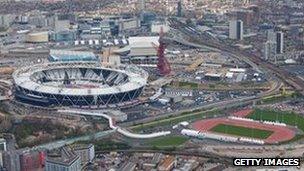'Social cleansing' housing benefit cap row: Duncan Smith hits back
- Published
- comments

The Olympic Park sits in the borough of Newham - one of the poorest in London
The government has defended its housing benefit cap after it emerged London's Newham council was trying to find homes for some families 160 miles away.
The council has been accused of "social cleansing", but its mayor said it was trying to find the best solution.
But Work and Pensions Secretary Iain Duncan Smith said there were "thousands of houses" within five miles of Newham which fell within the cap.
Westminster council is also understood to be considering a similar proposal.
As part of its welfare reforms, the government has introduced weekly caps on housing benefit of between £250 for a one-bedroom flat and £400 for a four-bedroom property.
Local Housing Allowance, which is used to determine housing benefit payments, has also been changed so it is being calculated on the basis of cheaper rents - rather than on the mid-point of rents in an area.
'Overheat'
Labour-controlled Newham Council runs one of London's poorest boroughs in the east of the city - which is home to much of the new 500-acre Olympic Park.
It has written to Brighter Futures Housing Association in Stoke-on-Trent, offering it the "opportunity" to lease it homes for up to 500 families on housing benefit.
It says the local private rental sector in Newham is beginning to "overheat" because of the "onset of the Olympic Games and the buoyant young professionals market", and it can no longer afford to house tenants on its waiting list in private accommodation.
Newham Council is offering to pay Brighter Futures 90% of the local housing allowance plus £60 per week.
But Brighter Futures chief executive officer Gill Brown says she will not agree to the request: "I think there is a real issue of social cleansing going on.
"We are very anxious about this letter which we believe signals the start of a movement which could see thousands of needy people dumped in Stoke with no proper plan for their support or their welfare."
She said previous efforts to relocate needy people had put strain on local public services and led to "the collapse of already vulnerable neighbourhoods and the rise of divisive right-wing extremism".
'Not pushing'
Newham's mayor, Sir Robin Wales, blamed government policies which had left his borough "chasing around the country trying to find ways to deal with people who are in need".
He told BBC Radio 4's Today programme: "We have got a waiting list of 32,000 - we've got hundreds of people looking for places to stay and the result of government benefit cuts, which are still working through as well, means that many more people from wealthier parts of London are looking for places to live in London and they're just not there.
"We have written to 1,179 organisations [housing associations] saying could you accommodate some people? We're not looking to push people all to one place, we're looking to find the best possible solution for citizens."
But ministers have pointed to a £190m discretionary fund available to help councils and insisted that even after the cap, families can still claim up to £21,000 a year towards their rent.
Mr Duncan Smith said the cap had been in place since April 2011 and "every other council" was "managing" with it even though it was "difficult".
"We need to get people into housing they can afford to go work from, so the taxpayer doesn't have to foot that bill."
He added: "I suspect this is somewhat a little political at a time of local elections."
'Kosovo-style cleansing'
Ministers say the way housing benefit is calculated means 30% of homes in an area will be within the cap - and they argue the changes are simply "shaving £2bn off a £25bn per annum budget".
Grant Shapps: Newham move "unfair and wrong"
But Sir Robin said just because there were 1,000 properties available, did not mean landlords would take housing benefit claimants.
Meanwhile, Westminster is said to be considering an offer from Smart Housing Group - a private association with homes in Nottingham and Derby - in conjunction with its partner councils Chelsea and Hammersmith, and Fulham.
It has suggested it could provide properties for Westminster residents deemed "homeless" as a result of the cap - and if accepted, each of the three London councils would send 50 families.
Ben Denton, Westminster's director of housing, worklessness and regeneration, said there were more than 1,000 families on the waiting list so it had no option to look for "fair and realistic" alternatives.
He said candidates for a move were those "with minimal connections to Westminster", while those with "a genuine need to live in Westminster such as those with children at crucial stages in their education or those with social care packages", a discretionary payment could be made to allow them to stay.
Shadow communities secretary Jack Dromey said the government's policies were "harming families and forcing them from their homes" and as private rents in London had risen by 7% in 2011.
When the housing benefit cap was announced in 2010, London's Conservative Mayor Boris Johnson said he would "not accept any kind of Kosovo-style social cleansing of London" adding: "The last thing we want to have in our city is a situation such as Paris where the less well-off are pushed out to the suburbs."
- Published24 April 2012
- Published24 April 2012
- Published24 April 2012
- Published13 June 2011
- Published4 November 2010
- Published28 October 2010